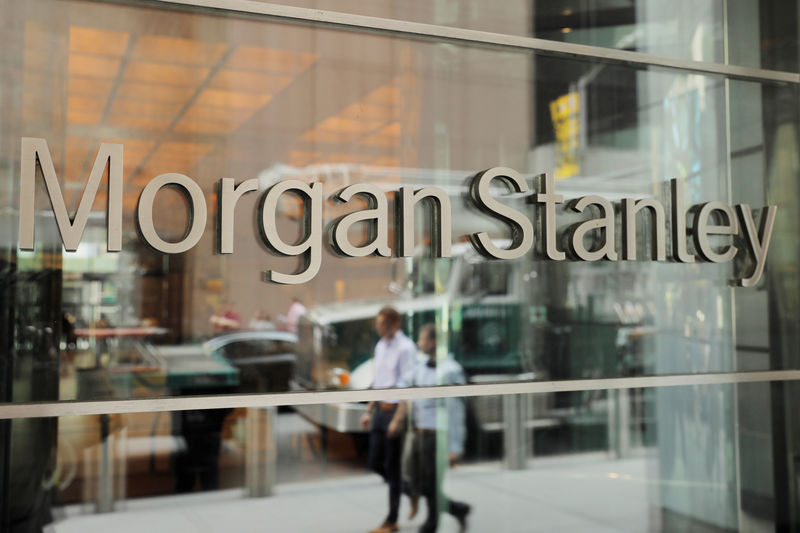By Elizabeth Dilts Marshall and Imani Moise
NEW YORK (Reuters) - Morgan Stanley (N:MS) and Bank of America Corp (N:BAC) are expanding the employee-benefits services they offer, hoping to gain market share in the dull-but-reliable business of managing wealth for companies and employees.
The banks, which operate the two biggest U.S. wealth management firms, are focused on different parts of the benefits business, executives told Reuters. But both strategies create opportunities for the firms to market to younger and middle-class clients.
Morgan Stanley is building on its $850 million purchase of Solium Capital, which manages employee stock plans for some 3,400 companies and 2.7 million employees.
Morgan Stanley has renamed it Shareworks and is looking to roll out deferred compensation management, health savings accounts and student loan refinancing. The firm is also considering partnering with a payroll company.
Meanwhile, Bank of America has focused on retirement services, with significant growth in its 401(k)s and health service accounts businesses.
The bank now manages plans for about 30,000 companies covering 5 million people. It ranked No. 7 on PlanSponsor.com's annual list of 401(k) record-keepers by assets last year, three notches higher than in 2017.
The two banks typically cater to older, wealthy families. By providing wealth services to companies, they hope to start relationships with young workers that could develop into one-on-one wealth management relationships later.
The investments Morgan Stanley and Bank of America are making in workplace benefits services reflect the global banking industry's shift toward steadier, fee-driven businesses to offset a secular decline in trading revenue since the 2007-2009 financial crisis.
However, the business has become more competitive in recent years. Fidelity, Vanguard and TIAA are consistently ranked as the top three employee-benefits providers, and Charles Schwab Corp (N:SCHW) and E*Trade Financial Corp (O:ETFC) have substantial stock plan businesses.
Companies only consider changing financial institutions about once a decade, and retirement products are fairly standardized, leaving little incentive to switch.
Combined with a push to reduce investor fees and the hefty expense of operating an employee-benefits operation at scale, it could be hard for Morgan Stanley and Bank of America to succeed, analysts said.
"This is a very fee-sensitive industry," said Anastasia Krymkowski, an associate director at research firm Cerulli Associates specializing in retirement. "It's an even bigger deal in 401(k) plan management because you have this idea of being a good fiduciary."
OPPORTUNITIES FOR GROWTH
Nonetheless, executives at the two banks told Reuters in separate interviews that they see opportunity to grow revenues and gain clients through these businesses.
Bank of America believes it can pick up clients left behind by JPMorgan Chase & Co (N:JPM) and Wells Fargo & Co (N:WFC), which both quit the 401(k) business in recent years.
And Morgan Stanley bought the most popular software platform for employee stock plans, making it difficult for rivals to compete.
Morgan Stanley has added 200 new corporate clients since the acquisition and estimates that, overall, employees on Shareworks' platform have $1.5 trillion in other accounts.
Executives predict that, over the next decade, they can turn hundreds of thousands of employees into customers of the firm's robo-adviser or its full-service brokerage.
"It creates value for the employer, the employee and creates a new source of potential clients for us," said Jed Finn, chief operating officer of Morgan Stanley's wealth unit.
Analysts said revenues earned from Shareworks will be minimal in the near-term but later could create substantial business.
Bank of America's strategy to market a full suite of employee benefit products, including 401(k)s, equity compensation plans and health savings accounts, to existing clients in other parts of the bank also makes it money now.
Bank of America added nearly 3,000 corporate clients to its institutional retirement business in 2018, up about 50% from the prior year. So far this year, it has added another 2,190 of them. That includes 401(k)s, HSAs, employee stock and defined benefit plans.
"The vast amount of wins come from existing clients," said Alastair Borthwick, Bank of America's global head of commercial banking.
Still, only about 10% of Bank of America's corporate clients use its retirement services, presenting the bank with an opportunity, Borthwick said. The institutional retirement business is hiring more retirement specialists to help pitch these products.

"Getting a company to turn on a 401(k) or a stock plan administration takes time," said Glenn Schorr, analyst at Evercore ISI. "The good news is that they already have relationships with their target market customer and now it is up to them to convince them."